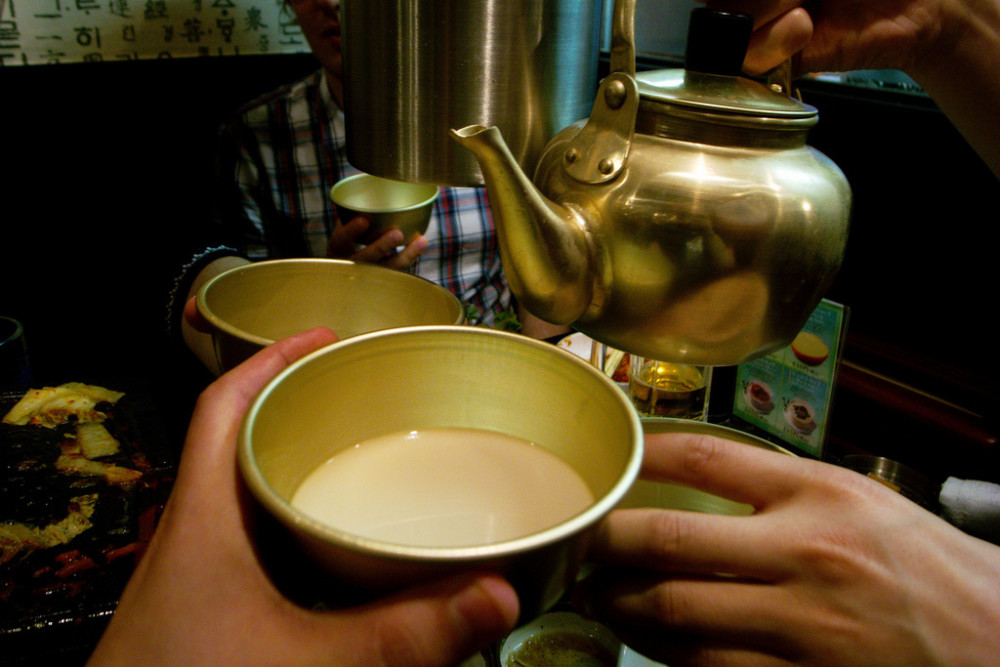By Alan Wooten
The Fayetteville Observer, N.C.
WWR Article Summary (tl;dr) Entrepreneur Lydia Contreras hopes that people will soon be asking for “Makgeolli”, a fermented rice wine just as much as people order Sake at a Japanese restaurant.
The Fayetteville Observer, N.C.
Lydia Contreras had the idea. Her aunt had command of the Korean language. And her best friend had 10 years with the military and a flair for salesmanship and marketing.
All they needed to start bringing Korean wines to North Carolina was the permits from the state Alcoholic Beverage Commission.
When that hurdle was cleared last summer, a 10-year exclusivity pact came with it, planting history-making International Wines Inc. on Airport Road as the center of wholesale distribution for North Carolina.
A military town like Fayetteville seems like the right location.
“A lot of soldiers get excited to try soju when they are in South Korea,” said Jennifer Quinones, the marketing manager.
Part of the reason, she said, is the impact rice wines have with other alcohol. Soju is a clear wine, somewhat flavorless or tasteless. It can be mixed with any beer — from good ol’ fashioned Budweiser to the newer more trendy craft beers. Can, bottle or draft, the taste of the beer isn’t compromised, but it gets an extra kick from the wine. Same for your favorite liquor.
Makgeolli, a fermented rice wine, has other benefits that are sought. It contains all the vitamins, has a lot of amino acids, is a little cloudy and has a milky texture with no dairy. It actually has micro-organisms. The entrepreneurs say it might be served in a ceramic tureen with a wooden scoop and little bowls to drink it from, providing a sociable drink with a communal pour. Quinones said one 7.5-liter bottle “is like a hundred yogurts without the dairy.”
Soldiers who have done a tour in Korea are usually familiar with soju. It wasn’t legal in the U.S. until classification as a rice wine or beer was made.
It has been legal in New York and California for some time, and in Georgia and Washington state more recently. International Wines’ first permit applications were filed in May 2015.
“It is very scary in a sense because it’s never been done before, and I don’t have too much experience with wine, except I’m Korean,” said Contreras, born in Georgia to a Korean mother and Puerto Rican father who served in the U.S. Army. “I know the flavors, and I’ve drunk this kind of wine. We would always go to Georgia to get it. I’m excited and have a good partner with Jennifer.”
Her aunt, Yeong Kim, was instrumental in helping them get established with Korean supermarkets and restaurants in the state’s three largest metropolitan areas. They supply restaurants, wine shops, craft beer shops and some grocery stores. They also have a deal with the new H Mart in Cary.
“It was Lydia’s idea,” Quinones said of starting the business, “but her aunt speaks fluent Korean, so that helps. Now Lydia has a hold of it. It’ll be up to Lydia to put it in other markets, like Chinese and Filipino. And I found out rice wines are popular in India.”
Contreras said the international appeal is a big help to the venture.
“I love that American wine shops are open to try wines from everywhere, and we love to do tastings for them,” Contreras said.
“They give a lot of samples.”
Samples can be especially helpful if the names are not familiar: makgeolli, seju, soju, bekseju, bokbunja and cheongmaesil, for example.
International Wines has already struck deals and distributed along most of the Interstate 85 corridor — in Charlotte, places in and between Winston-Salem and Burlington, and its strongest presence is in the Triangle.
Fayetteville’s locations grew to eight this past week when Grapes & Hops, with three locations, signed on. It’s also at Sun Supermarket, Kobe Japanese Steak House, Samurai Japanese Steak House and Sushi Bar, Sapporo Restaurant and Star Music Studio. They hope Fort Bragg is among future locations.
International Wines carries just one product, Nari Joa, that requires a fortified wine license. Each of its other offerings requires an unfortified wine license.
“I’m hoping just to get all of our stuff out there, in Walmarts and everywhere, to be that big,” Contreras said. “When you go to Japanese restaurants, you hear sake. I want everyone to know this name, soju and makgeolli.”
As the marketer, Quinones said, she’s tasked with educating the public on what they have to offer. She wants the question of customers to businesses to be, “Do you have rice wine?”
“Sake is recognized and people know what it is,” Quinones said. “But soju is the No. 1 alcoholic drink in the whole world. They sell more than everything combined. We’re trying to bring that realization here to North Carolina.”














































































































































































































































































































































































